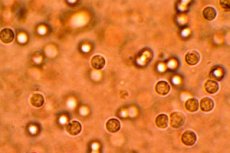Modified and unchanged erythrocytes in the urine of men: what do they mean?
Last reviewed: 23.04.2024

All iLive content is medically reviewed or fact checked to ensure as much factual accuracy as possible.
We have strict sourcing guidelines and only link to reputable media sites, academic research institutions and, whenever possible, medically peer reviewed studies. Note that the numbers in parentheses ([1], [2], etc.) are clickable links to these studies.
If you feel that any of our content is inaccurate, out-of-date, or otherwise questionable, please select it and press Ctrl + Enter.

Erythrocytes in the urine of men are an important diagnostic sign and prognostic factor that may indicate various pathological conditions. It can also be one of the signs of increased load on the internal organs and systems, impaired adaptation potential of the kidneys. Sometimes it is a sign of poisoning or severe infection.
Causes of increased red blood cells in the urine of men
The main causes of the appearance of elevated erythrocytes in the urine of men are similar to those in women. The level of red blood cells increases if inflammation of the kidneys and urinary organs is observed. This may be a sign of a hormonal imbalance or the development of an autoimmune process (mainly affecting the kidneys). It can be a symptom of intoxication of the body (including food, alcohol poisoning, poisoning by bacterial and viral endo- and exotoxins). Indicates an increased load on the kidneys, a violation of their normal functional state.
Norm
Normal in the urine in men should not be red blood cells. Conditionally allowed no more than 1-3 red blood cells in the field of view (single).
Erythrocytes and protein in the urine
Protein in the urine always indicates the development of pathology of the kidneys. Erythrocytes and protein in the urine, especially in men - a sign of inflammation, intoxication. It can also be a sign of urological diseases, endocrine dysfunction, prostatitis, prostate inflammation, and dysbacteriosis. It is worth noting that it is especially important to control these indicators after 45-50 years, when the reproductive function gradually begins to fade, and the man’s body produces less testosterone, because at this time the body is in a state of adaptation, the load on the kidneys, liver, and other organs increases significantly. , intoxication of the body develops.
 [5],
[5],
Modified red blood cells in the urine of men
Altered erythrocytes often appear in the urine of men as a result of poisoning, exposure to the organism of poisons of various origins. Usually, this picture develops against the background of heavy metal poisoning, chemical reagents. Depending on the number of such erythrocytes, and the level of changes, one can judge the nature of the pathological process: from mild poisoning, inflammation to severe renal failure. Also, altered red blood cells may indicate the development of anemia, bleeding. In the postoperative period, this is one of the unfavorable signs indicating a high risk of bleeding and anemia. A similar picture is observed with a large blood loss, including with latent and internal bleeding.
Single red blood cells in the urine of men
The appearance of single red blood cells in the urine requires re-diagnosis, especially in men. This may be a sign of inflammation, dysfunction, urological diseases. But red blood cells can also randomly get into the urine, for example, when urinating, as a result of the improper toilet of the external genitalia. Mandatory retesting is required to confirm or reject the diagnosis.
Erythrocytes in the urine entirely in men
In men, normal should not be red blood cells in the urine. If they appear, it indicates the development of the inflammatory process, impaired normal functioning of the kidneys, liver, hormonal disturbance, in particular, a decrease in the level of vasopressin and other hormones. It can also be a sign of poisoning. The more red blood cells found in the urine, the more severe the degree of intoxication and the worse the prognosis.
Red blood cells in the urine can be altered, or unchanged. Thus, the appearance of unchanged red blood cells in the urine is often observed in diseases of the kidneys and urinary tract. This is a negative sign that indicates that the kidneys are not coping with the load. It can also be a sign of poisoning. A similar picture is observed in hypertension, any other diseases associated with vascular tone, the circulatory system. In more severe cases, it is a sign of the development of malignant tumors and severe diseases of the urinary tract, including kidneys (pyelonephritis, glomerulonephritis, nephritis, kidney tuberculosis). Unchanged erythrocytes may indicate the development of infectious diseases of the kidneys, including viral, bacterial.
Sometimes red blood cells in the urine appear completely in older men - this is a negative sign that may indicate a violation of the functional state of the kidneys, an increased load on them, the development of senile, degenerative processes. This may be a sign of impaired concentration ability of the kidneys, resulting from the development of many acute and chronic kidney diseases. In addition, red blood cells in the urine of men may indicate an intense hormonal adjustment, a change in the functional state of the body.

